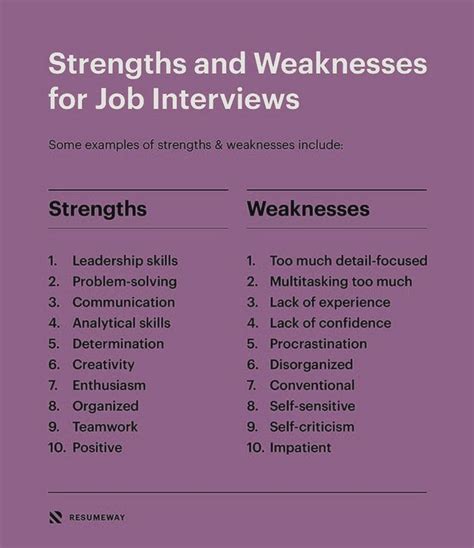Impressive Weakness Examples: Ace Job Interviews In 2023

Job interviews can be nerve-wracking, especially when you’re asked to talk about your weaknesses. However, discussing your weaknesses in a positive and constructive manner can actually make you stand out as a candidate. In this post, we will provide you with impressive weakness examples and tips on how to ace job interviews in 2023.
Why Discussing Weaknesses is Important
Many interviewers ask candidates to talk about their weaknesses to gauge their self-awareness, honesty, and ability to learn and grow. It’s also a way to see how well they fit the job requirements and company culture. Moreover, discussing weaknesses can show that you have taken the time to reflect on your flaws and have a plan to address them.
How to Choose the Right Weakness
Choosing the right weakness is crucial to make a positive impression on interviewers. You don’t want to pick a weakness that is essential to the job or implies a lack of basic skills or qualifications. Instead, you should choose a weakness that is not critical to the job but still relevant and can be improved upon. Here are some examples:
- Difficulty with public speaking
- Being too detail-oriented
- Procrastination
- Being too self-critical
- Difficulty with time management
These weaknesses are not uncommon and can be improved upon with practice, training, or coaching. However, you should also show that you have taken steps to address your weakness, such as attending a public speaking course or using time management tools.
How to Frame Weaknesses Positively
Once you have chosen your weakness, you need to frame it positively to show that you have a growth mindset and are committed to self-improvement. Here’s how:
1. Acknowledge the weakness
Start by acknowledging your weakness in a brief and honest way. For example: “One weakness I have is that I tend to procrastinate on tasks that I find challenging.”
2. Explain the impact
Then, explain how your weakness has impacted your work or team. For example: “This has sometimes led me to miss deadlines or rush through projects, which I know is not ideal.”
3. Show your plan for improvement
After that, show that you have a plan to address your weakness and have taken steps to improve. For example: “However, I have recently started using the Pomodoro technique to break down tasks into smaller, manageable chunks and stay focused. I have also set realistic deadlines for myself and have been tracking my progress.”
4. Highlight your strengths
Finally, highlight how your weakness has helped you develop other strengths or skills. For example: “I have learned to be more creative and resourceful in finding solutions to overcome my procrastination and have also improved my time management and prioritization skills.”
Impressive Weakness Examples
Here are some impressive weakness examples that you can use as inspiration:
1. Being too self-critical
“One weakness I have is that I tend to be too hard on myself and focus too much on my mistakes and shortcomings. However, I have realized that this can be counterproductive and have been working on cultivating a more positive and growth-oriented mindset. For example, I have been practicing self-compassion and reframing my negative thoughts into constructive feedback.”
2. Difficulty with public speaking
“One weakness I have is that I tend to get nervous and stumble over my words when speaking in front of large groups. However, I have been taking steps to improve my public speaking skills, such as attending Toastmasters meetings and practicing in front of a mirror or with trusted colleagues. I have also been studying effective communication techniques and have been applying them in my daily interactions.”
3. Being too detail-oriented
“One weakness I have is that I tend to get caught up in the details and lose sight of the big picture. However, I have come to realize that this can sometimes slow down my progress and hinder my creativity. Therefore, I have been working on developing a more strategic and holistic approach to problem-solving. For example, I have been delegating tasks more effectively and seeking feedback from my colleagues to ensure that I am on track.”
Conclusion
Discussing your weaknesses in a positive and constructive manner can make you stand out as a candidate and show that you have a growth mindset and a plan for self-improvement. By choosing the right weakness, framing it positively, and highlighting your strengths, you can impress interviewers and increase your chances of getting hired.
FAQs
Q: Should I mention a weakness that is critical to the job?
A: No, you should avoid mentioning a weakness that is essential to the job or implies a lack of basic skills or qualifications. Instead, choose a weakness that is not critical but still relevant and can be improved upon.
A: While it’s not necessary to mention a weakness that is not related to work, it can show that you are a well-rounded person and have self-awareness in all aspects of your life. However, make sure that your weakness is still relevant and can be improved upon.
Q: Should I mention a weakness that is not true?
A: No, you should never lie or exaggerate about your weaknesses in a job interview. Interviewers can easily spot insincerity and it can damage your credibility and chances of getting hired. Instead, be honest and show that you have a plan to address your weakness.
